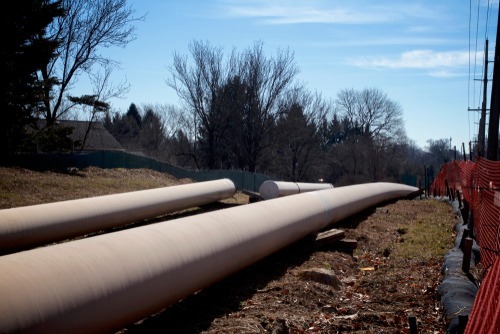
Organized labor and the business community locked arms during a Republican-led state Senate hearing Monday against what they consider a concerted effort by radical environmentalists to choke off the Pennsylvania natural gas industry’s access to vital consumer markets.
The joint hearing of the Senate Community, Economic & Recreational Development Committee and the Senate Environmental Resources & Energy Committee provided a friendly setting for what was likely a dress rehearsal for the 2022 gubernatorial campaign that will attempt to unseat Democratic Gov. Tom Wolf. Wolf has been chastised regularly this year for allegedly failing to stick up for the thriving, but now threatened, energy industry against a “radical” environmental movement that will put scores of jobs, and perhaps the state’s economy itself, in jeopardy.
“A radical environmental agenda driven by blind ideology over good science is promoting a false premise that the only climate solution is to end natural gas production in the United States,” said Sen. John Yudichak (I-Luzerne/Carbon), chair of the Community, Economic & Recreational Development Committee. “Pennsylvania is a world leader in natural gas production which has bolstered our economy and enhanced our ability to reduce carbon emissions by 34 percent over the last decade.”
The official topic of the hearing was to explore the consequences of failing to invest in adequate infrastructure to tap into the bountiful Marcellus Shale gas fields. The recent fallout includes industrial projects such as the Philadelphia Energy Solutions refinery and a U.S. Steel plant in Allegheny County. In addition, the $1 billion PennEast pipeline was called off last month amid costly legal battles.
The Senate hearing concluded that pipelines were quite safe with the chances of an accident running at a fraction of a percent, thanks mainly to the state’s already strict permitting process and the pool of homegrown workers who have years of experience building and maintaining the gas pipeline network.
Union leaders testified that the industry generally functions smoothly with a steady flow of projects that keep skilled workers employed and residing in Pennsylvania. “The perceived choice between pipelines and the environment is a false choice,” said Tony Seiwell, Business Manager for Laborers’ District Council of Eastern Pennsylvania. “Our members are uniquely qualified to build pipelines, not only because of their high-quality training, but also because they live and raise their families in the same communities where they work. Like our opponents, we want to ensure that projects are completed safely to protect our environment for our future generations.”
In addition, gas was reaffirmed as a solid baseline fuel that burns far cleaner than coal and is cheaper and more abundant than wind or solar power. The need for gas to keep both economy and ecology on track, however, requires an expanded network of up-to-date pipelines to ship gas to customers in Pennsylvania as well as New England and the New York City region.
“Pipelines are an environmental asset,” said Sen. Gene Yaw (R-Lycoming).
That flow, however, can be derailed through aggressive litigation and lobbying by opposition groups, which can throw off intricate construction schedules, discourage investors and indefinitely sideline crews that had been lined up for the job and were counting on a lucrative project to begin at a certain time. The delays can force some workers to decamp permanently to other states or muddle through a Christmas season that had been turned from merry to grim.
“Litigation by activists and delays by overzealous regulators make it nearly impossible for projects to move forward,” said Seiwell. “These actions create an impossible business climate, and they should be called out as simply unethical.”
Broadsides were also fired at neighboring New Jersey, where PennEast ran into objections over its condemnation of state-owned land that went all the way to the U.S. Supreme Court. PennEast prevailed in that matter, but the prospect of further wrangling to obtain water-quality permits from the state led to the developers throwing in the towel.
The industry’s quarrel with New Jersey was a lead-in to the Regional Greenhouse Gas Initiative (RGGI), the multi-state organization that uses a mandatory binding cap system to reduce carbon dioxide emissions, mainly from industrial sources and power plants that are major consumers of Marcellus gas while also employing large numbers of union workers. Republican lawmakers and the business community have been incensed that Wolf decided to bring Pennsylvania into RGGI through an executive order rather than running it through the General Assembly where its fate would be uncertain at best.
Witnesses Monday again cast RGGI as a cudgel for politicians playing up to green activists at Pennsylvania’s expense, implying that the only way to block the process would be to replace Wolf with a pro-energy Republican.
“To defend our workers, our tax base, our economy, and our future, policymakers in Harrisburg need to join across the aisle to advance a pro-production energy agenda for the commonwealth,” said David Taylor, President and CEO of the Pennsylvania Manufacturers’ Association. “And the most critical step at this hour is to require the consent of the General Assembly for Pennsylvania to join the Regional Greenhouse Gas Initiative. The RGGI states are the same ones working to thwart Pennsylvania energy production. They do not deserve to be rewarded and we should not put our fate in their hands.”